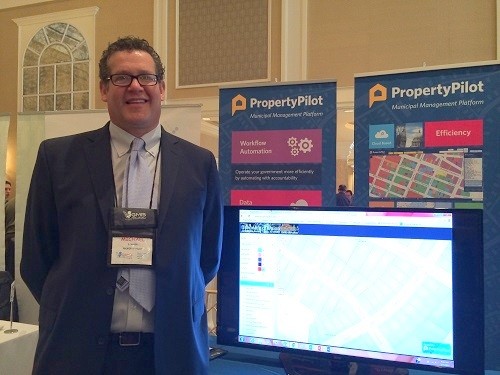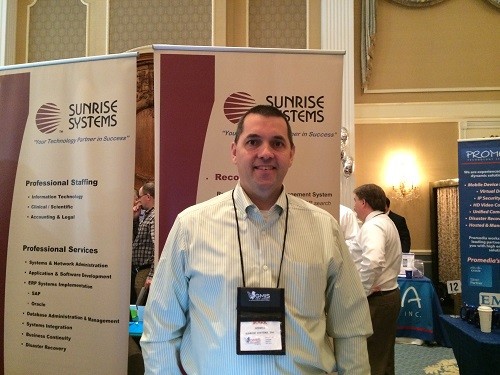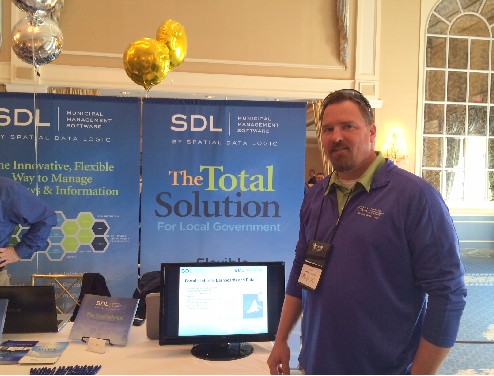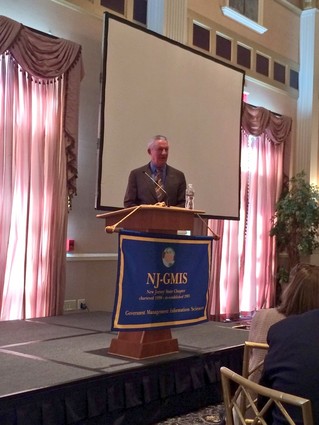NJ Government Infotech Leaders Get Leadership Tips at NJ-GMIS Conference
Hundreds of state and municipal government information technology leaders converged on the Palace at Somerset Park (Somerset) for the New Jersey Government Management Information Sciences (NJ-GMIS) conference that was held March 27, 2014.
NJTechWeekly.com dropped in long enough to speak with some of the exhibitors there, hear a keynote by retired General Jefferson “Beak” Howell Jr. on leadership and learn about how New Jersey libraries are offering networking help to schools and other community institutions.

Our first stop was on the conference floor, where we caught up with Michael Bonner, CEO and founder of PropertyPilot (Hoboken). The company makes a cloud-based platform that it says helps governments be more productive, efficient and transparent.

We also spoke with Mark Szemple, project manager at Metuchen-based Sunrise Systems, a services and solutions firm specializing in staffing, IT development and IT consulting services.

Later NJTechWeekly.com stopped by the booth of Spatial Data Logic (Somerset), which specializes in municipal software and says it has a solution that spans most municipal departments. We spoke to Tom Hurley, sales manager with the firm. This month Spatial Data Logic announced that the borough of Highland Park will be using its GeoLogic software in its zoning and building departments.
We then headed to a talk by Mike Rasimowicz, CIO of the New Jersey State Library, who discussed JerseyConnect, the statewide network for libraries. Some 70 percent of New Jersey libraries belong to that network. Rasimowicz believes the network could be used by K-12 schools to both upgrade their networks and save money. JerseyConnect could become a statewide Internet service provider for schools and local governments, he argued.
Howell’s keynote was full of anecdotes — some light and many not — from his career in the Marine Corps, as a fighter pilot and as the civilian head of the Johnson Space Center during the space shuttle Columbia disaster.
He called himself “the real-life personification of Forrest Gump” because, he said, so many of his career moves resulted from a combination of luck and being in the right place at the right time.
However, Howell told the group, “Sometimes things happen that make you take stock of your life.” He had been with the Marines for 16 years and had moved through the ranks to what he called a great assignment in Hawaii. Part of that assignment involved his squadron flying to Japan to train Japanese flyers in air combat. There were all kinds of rules of engagement set forth so that aircraft involved in these “war games” wouldn’t collide with one another. But the unexpected happened, and a Japanese trainee took off part of the nose of his aircraft.
After the incident occurred and Howell got safely back to his base, everyone on both teams agreed on what had happened. However, when the word got to brass, Howell was told, to his surprise, “The Chairman of the Joint Chiefs of Staff and the Commandant of Marines are upset that you rammed that aircraft.” He was also informed to brace himself; he was probably going to be relieved of command.
Of course, that never happened because the head of the Japanese Air Force called his superiors and took full responsibility for the incident. “He saved my bacon,” Howell said.
And that led to his first rule of leadership.
“From that day on I pledged to myself that when something bad happens I’m not going to shoot the messenger … and I’m going to get all the facts on the case before I make a judgment or come to a decision.”

Howell said he had decided that day to become a better leader, and he went back to study leadership. A key lesson he wanted to convey to the audience was the importance of keeping everyone informed about what is happening in an organization.
Said Howell, “You need to use every means possible to get the word out to your people, and be redundant ad nauseam. Don’t think that even when you put the word out, people are going to see it or understand it, even if they are looking you right in the eye. Ignorance is like a cancer in your organization, and it can eat through it. You can never inform them enough.”
After Howell retired from the Marines, he managed engineers at the Johnson Space Center (Houston) and finally became the director there. It was a wonderful place to work, he said, full of smart people. He enjoyed the post, and getting to hobnob with the astronauts, until 11 months into his first year, on Feb. 1, 2003, the Columbia space shuttle disintegrated in the atmosphere on the way home.
The takeaway from that experience: “From a leadership point of view, no matter what you do, have a plan for all the bad things that can happen. Meet with your people and brainstorm. Have drills and have ways to deal with everything,” Howell advised.
The Challenger disaster had occurred 15 years beforehand, so there was a plan in place, which staff immediately began to follow. “I wasn’t on any of the teams and had to figure out what I should do,” Howell said.
Howell determined that as a leader he needed to take care of people. He was the one who informed the space shuttle crew of what had happened to Columbia. He told them they had not only lost friends but NASA didn’t yet know quite how it was going to resupply the space shuttle, so they’d better start conserving. The Russians eventually sent a mission to resupply the shuttle, but it was very sobering to have to deliver this news, Howell said.
He then took over “taking care” of the families of the shuttle crew. NASA has a program that assigns two astronauts to each family related to someone in space. But in this case that wasn’t enough. There were mobs and cameras outside their homes. They needed to be kept company while they grieved and informed of the recovery effort, Howell said.
Also, as a leader, Howell had to take care of his workforce. Someone informed him that back during Challenger there was no memorial service for the workers to attend until weeks afterward. “We needed to bring our workforce together and give them closure,” he said.
Howell’s team immediately began making plans for a memorial. Of course, they had to change those plans when President George W. and Mrs. Bush, members of the Supreme Court and other dignitaries decided to attend it.
After the disaster, noted Howell, “we had a lot of experienced people who wanted to quit.” He had to take on yet another leadership role, that of cheerleader, encouraging workers to stay and urging them to see the disaster through to its aftermath.
He thought that if so many of the experienced people left, “we were never going to come back from this and put people in space again.”
Howell finished his talk by offering advice he said he had been given by his own mentor: good leaders are technically proficient so that people respect that they know what they are doing. They should be physically and mentally fit. “We are failing our people if we are not totally alert and prepared,” he said.
To be a good leader you have to be pure at heart, Howell concluded. Ask yourself what your purpose is as a leader. You should be there to serve your colleagues and help them be the best they can.

